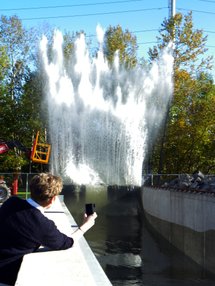ABOUT US
We provide
Consultancy-, Research-, & Educational Services in
Ocean-, Coastal-, Wind- and Structural Engineering
Fluid-Structure Systems undertakes analysis, input-to-design and design of structures with a focus on the wind and wave environment and structural vibrations. Our approach in preparation of structural design in fluid flow integrates theoretical, numerical and experimental methodologies. We further strive at integrating research into engineering consultancy results, evaluations and courses when necessary.
We assist in establishing and evaluations of MetOcean conditions in relation to conceptual/detailed design of marine structures and coastal protection in seas worldwide. We estimate wind and waves forces on marine/coastal structures and on various infrastructures. Offshore platforms/wind turbine farms, wave energy converters, harbours, breakwaters, coastal structures, bridges are examples of applications.
Besides consulting work, we conduct research, development, and strive at innovations, including collaborative efforts within areas of ocean/coastal/wind/structural engineering. We further evaluate reports and articles as a part of the peer-reviewed system in wind, ocean and coastal engineering communities.
We provide tailored courses and seminars on our expertise and lessoned learned from our projects and recent research findings.
Specialties
- Ocean waves, nearshore hydrodynamics, coastal processes & protection,
- Fluid/structural dynamics, fluid-structure interactions,
- Aerodynamics/aeroelasticity, turbulence,
- Wind/wave energy,
- Steel structures, behaviour of large structures, structural design,
- Structural vibration assessment including implementation of dampers,
- Numerical methods/analysis,
- Laboratory testing and
- Analytical estimates.
OUR APPROACH
Integration of theoretical, numerical
and experimental methodologies.
Many large structures behave unpredictable when exposed to wind and/or waves. It is therefore often necessary to do numerical analysis and/or physical tests. It is extremely important to validate numerical results against model scale tests which in turn must be validated against full-scale predictions whenever possible.
- Analytical estimates
- Detailed analysis
- Comparison of methods
- Laboratory testing
- Full-scale predictions
- Case study deliverables
THE PROCESS
STEP 1
Identifying data and
various project info.
STEP 3
Assessments
STEP 2
Calculations and/or
testing & numerical analysis
STEP 4
Results, conclusions,
recommendations and deliveries
OUR HISTORY
The company was founded in 2007 by J. B. Frandsen with the vision of improving research integration into industry projects
and teaching. Vice versa, industry projects may also be an inspirational source in education and research. Fluid structure systems are often challenged by physics involving full coupling between fluid and structure. To understand these processes, it involves setting up descriptive mathematical models accounting for nonlinear viscous boundary layer behaviour between small to large deflection of flexible structures and random or coherent high Reynolds no. flows. Ocean/coastal engineering problems are further challenged by accurately capture of steep/breaking waves and wave transformation. Missing the physics in model scale tests and/or numerical model predictions may results in undesirable structural vibrations and inaccurate load estimations. Scale effects, empirical description of fluid loading and various model uncertainties may mean safety factor in the order of 30% in design. This is a great concern economically, as structural optimization are then difficult to achieve. This has a more profound impact on the renewable wind and wave energy sectors than for example the oil- and gas industry. The above are key motivation of why our modelling efforts have a focus on predicting fluid loadings and their impact on structures & coast. We are also driven by discovering the undiscovered which may occur during detailed in-depth research projects. Furthermore, the company has been non-proffiting while carrying out academic services and/or external consultancy in relatively long periods of times. Dissemination of our work is a priority to the benefit of our society and new generation.






